|
|
|
Sort Order |
|
|
|
Items / Page
|
|
|
|
|
|
|
| Srl | Item |
| 1 |
ID:
154586
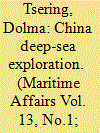

|
|
|
|
|
| Summary/Abstract |
In the last few decades, given China's growing dependency on the maritime realm, it has shifted its focus from securing borders to the pursuit of national maritime interests. China is overly dependent on the seas for maritime trade, secure energy supply, access to marine resources and access to the resources outside its borders. In this context, deep-sea exploration and capacity building emerge as important indicators of China's growing dependency on and interest in the maritime domain. Beijing's interest in deep-sea exploration and capacity building includes underwater resource exploitation, developing new technology and infrastructure related to deep-sea exploration, and maritime security. Given that China's deep-sea exploration is enmeshed with its larger geostrategic interests outside its borders, it raises a series of concerns for states in its neighbourhood. The military application of these deep-sea technologies is of greatest concern, besides power projection in the regional security domain. This paper seeks to study China's deep-sea exploration and capacity building in the context of technology and infrastructure. The paper covers contested intentions behind China's deep-sea exploration and the implications as well as concerns for China's neighbouring countries.
|
|
|
|
|
|
|
|
|
|
|
|
|
|
|
|
| 2 |
ID:
154569
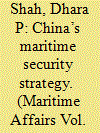

|
|
|
|
|
| Summary/Abstract |
In January 2017, China released its first ever White Paper on Asia-Pacific security cooperation, which sought to embolden Beijing’s (littoral) leadership in the region. Highlighting maritime security in the Asia-Pacific as a regional hotspot, the policy paper called for the establishment of a favourable regional order by underlining the merits of cooperative security. Simultaneously, it also sought to entrench China’s sovereign interests by displaying a ‘reactive assertiveness’ in the maritime domain. Referring to the South China Sea (SCS) dispute in particular, the paper declared that while China remained committed to upholding freedom of navigation in the SCS, it would also not shy away from making a “necessary response" to violation of its territorial integrity. Beijing’s desire to enhance its economic and military influence in the maritime domain understandably has an effect on the security calculus of the Asia-Pacific. In response to China's growing military capabilities and assertiveness in international waters, other regional players have also been emboldened or forced to stake territorial claims in the interest of their sovereignty. The consequent insecurity, tension and power play is likely to have a destabilising effect on the region. It is in this context that this paper attempts to analyse China’s maritime security strategy as outlined in the White Paper, on three counts: by analysing threat perceptions from the Chinese perspective, by outlining the need to build a comprehensive maritime security framework that addresses the interests of all stakeholders in the region and, finally, by analysing security implications for India.
|
|
|
|
|
|
|
|
|
|
|
|
|
|
|
|
| 3 |
ID:
154580


|
|
|
|
|
| Summary/Abstract |
Since the establishment of diplomatic relations in 1951, Pakistan's desire for strategic parity with India and China's efforts to propel Pakistan as a strategic balancer to India have been the overarching factors for the emergence of a security centric Sino–Pak relationship. Over the years, it has diversified into an economic-centric relationship. Although military and technological transactions continue to dominate the economic relationship, China began gradually pledging increased investment in Pakistan's economy and infrastructure. China became the primary investor for building the Gwadar deep-sea port in 2002. Both sides signed a free trade agreement and agreed to link China's rail network to Gwadar Port through the Karakoram Highway in 2008. The commitment to develop Gwadar Port is a good indicator of the steady expansion of Chinese maritime interests and strategic influence in India's neighbourhood.
|
|
|
|
|
|
|
|
|
|
|
|
|
|
|
|
| 4 |
ID:
154578


|
|
|
|
|
| Summary/Abstract |
This article examines whether the physical determinants of Sri Lanka have a significant impact on the formulation of the United States’ foreign policy. It also analyses whether Sri Lanka’s close proximity to the sea lines of communication (SLOCs) has any influence on the United States’ urge to link businesses and people, and also to reaffirm its interests and influence in Sri Lanka. The paper will briefly touch upon the security and military advantages that the United States enjoys in South Asia. It also ascertains whether American foreign policy towards Sri Lanka will be largely driven by economic factors, and due to Sri Lanka’s location as well as the ability to integrate the island nation to America’s future interests in the region.
|
|
|
|
|
|
|
|
|
|
|
|
|
|
|
|
| 5 |
ID:
154572
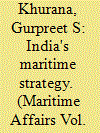

|
|
|
|
|
| Summary/Abstract |
In the coming years, India's maritime-military power is likely to play an increasingly crucial role in shaping the geo-political, economic and security environment in the maritime-configured Indo-Pacific region. This paper aims to analyse India's maritime security strategy promulgated by the Indian Navy in October 2015. The analysis goes beyond the text of the document, to provide a more profound understanding of four key underpinnings of India's strategy: historical and societal factors, maritime geography, political geography/jurisdiction and the China factor. The analysis begins with examining the salient changes in India's maritime-strategic outlook since its first strategy document was published in 2007.
|
|
|
|
|
|
|
|
|
|
|
|
|
|
|
|
| 6 |
ID:
154583


|
|
|
|
|
| Summary/Abstract |
There has been a clear growing maritime intent in India–US cooperation in the past few years and bilateral interests have come to converge, due to both the individual countries' interests and regional common goals. As an economically and militarily developing country, India seeks to expand its strategic influence the Indian Ocean Region (IOR). It also comes across as the most stable and powerful country in the region that could support the long-term interests of the US in the region. The US sees India as a significant balancer of China in the region, and the Indian Ocean as a maritime opponent to the South China Sea. As the US–China rivalry continues in the Asia-Pacific, the Indian Ocean remains the stable pivot from where the Asian power balance will be string-held. More importantly, going forward the Indian Ocean could be divided into maritime sub-regions of influence based on two emerging opposite power axes.
|
|
|
|
|
|
|
|
|
|
|
|
|
|
|
|
| 7 |
ID:
154574
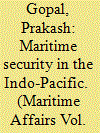

|
|
|
|
|
| Summary/Abstract |
The strategic construct of the Indo-Pacific has today gained salience due to the region becoming the centre of gravity of economic development and social mobility. This has been driven, to a large extent, by commercial maritime activity and the assurance of security on the global commons. The US has played a significant role in the provision of this security, with Japan and Australia emerging as vital regional partners in this effort. While the US' presence in the region was primarily motivated by its Cold War aim of containing communism, the post-Cold War period has demanded a fresh approach to maritime security in the Indo-Pacific. Transforming geo-political and strategic considerations have, however, raised questions on the continued efficacy of this system. With the somewhat problematic rise of China, the US, Japan, Australia and India, as major regional maritime powers, need to evolve a regional maritime security architecture that will continue to support the peaceful and legitimate use of the seas.
|
|
|
|
|
|
|
|
|
|
|
|
|
|
|
|
| 8 |
ID:
154585


|
|
|
|
|
| Summary/Abstract |
The Indian Ocean can be a convergent and cooperative maritime space for India–Russia relations. Russia can achieve its ambitions to re-emerge as a “great power” and as an influential global player in international politics, while India can reinforce its dominance in the region. Since the 18th century, Russia has sought a presence in the Indian Ocean, and there is a long history of Soviet naval forces operating in the region. However with the disintegration of the Union of Soviet Socialist Republics (USSR), its influence was reduced dramatically. The increasing importance of the Indian Ocean to Russia has been driven by the fact that it is the home to two competitive economies – China and India – along with other emerging Indian Ocean Region countries. On the other hand, increasing Chinese activity, especially its ambitious One Belt One Road (OBOR) initiative through the Indian Ocean Region, and Russia's interest in joining the China–Pakistan Economic Corridor (CPEC) may have threatened India's interests. While considering Russia–India relations, little has been explored beyond defence cooperation. Besides, India's cold response to the OBOR initiative may lead to its marginalisation in the region.
|
|
|
|
|
|
|
|
|
|
|
|
|
|
|
|
| 9 |
ID:
154576
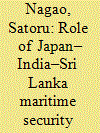

|
|
|
|
|
| Summary/Abstract |
This paper focuses on the importance of Japan–India–Sri Lanka cooperation in the Trump era. Japan's security policy gains even greater salience after Donald Trump's victory in the US Presidential elections. Although President Trump has promised to enhance US military might, the US' influence as a security provider has been declining. The Trump administration may also need time to re-establish a security policy and to evaluate its influence effectively. US allies and friendly countries now require a new security framework to adjust to the situation, one which seems to be emerging. This framework is a security network of numerous bilateral, trilateral, quadrilateral, and other multilateral cooperative relationships among US allies and friendly countries. Under this new system, Japan–India–Sri Lanka cooperation has an important role. In the new security order, there is a high probability that India will be the most influential sea power in the Indian Ocean. The strategic location of Sri Lanka has a significant influence on the security of the entire Indo-Pacific. To gainfully obtain its support, Japan and India need to find out what kind of support Sri Lanka needs, for which the Japan–India–Sri Lanka Trilateral Strategic Dialogue will be the best structural mechanism.
|
|
|
|
|
|
|
|
|
|
|
|
|
|
|
|
| 10 |
ID:
154581


|
|
|
|
|
| Summary/Abstract |
Vietnam–India relations have been nurtured over several centuries. In recent years, the bilateral political relationship has been upgraded to strategic and comprehensive strategic partnership in 2007 and 2016, respectively. There has also been proactive growth in all sectors of the bilateral relationship, across economic, cultural and strategic dimensions, including maritime cooperation. In the context of increasing security challenges and threats to the freedom of navigation and overflight in the South China Sea, along with other non-traditional security issues in the maritime domain such as piracy and terrorism, there is a critical need for an enhanced Vietnam–India maritime cooperation. This paper examines the current status of maritime cooperation between Vietnam and India, and affirms urgent requirements making two countries deepen their maritime cooperation.
|
|
|
|
|
|
|
|
|
|
|
|
|
|
|
|
|
|
|
|
|